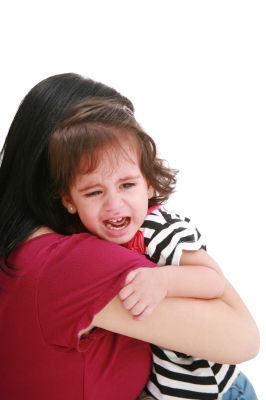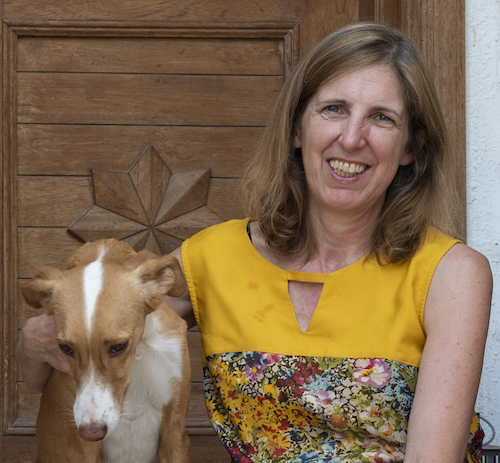Do Kids Experience Grief about their Special Needs?

Photo Credit: David Castillo Dominici at www.freedigitalphoto.net
Have you ever wondered if children experience grief about their special needs? Today’s guest blogger, Maggi Gale, has an astounding post about her three-year-old daughter’s need to grieve the scars caused by her very early corrective surgery (She was born with EA/TEF). Grab a tissue and prepare for a fascinating read!
We Are All Different and It’s Okay
My two daughters, Phoebe and Lois, were sitting to the table eating their dinner. Lois, 3-years-old, was wearing a halter top; the less clothes the better in tropical Africa! She suddenly stretched up her right arm and felt her scar with her left hand. We had always been amazed at how clever the surgeon had been to cut under her arm and operate on her esophagus from there. It was a neat, but nevertheless, big scar.
Suddenly 3 years of pent-up frustration and pain welled up as Lois sobbed, “Why am I not like Phoebe?” As I scooped her up and held her, she poured out her heart. Her sobs came from deep within. Despite the fact that we never mentioned her scar, it was there, and unbeknownst to us, she associated it with her health problems, and the ways in which she felt different. Instinctively I knew it was crucial that she express herself, and that I acknowledge what she was trying to say through her limited vocabulary.
Yes, she was different.
And no, it wasn’t fair.
I agreed that we are all different: I was wearing glasses, other people had trouble walking, some people couldn’t hear…
We are all different, but she certainly had struggles that most children didn’t have. As she lay down to sleep that night, I smiled as she told herself these truths again: We’re all different and it’s okay.
A few days later a friend gave me a book–I’m Special by Jen Green which is based on the same idea. She drank in the words and the thoughts behind them. The book is still on her shelf to this day.
Months later, an educational psychologist pointed out that Lois had needed to grieve. She sensed loss in what she saw that others had, but she didn’t have: an ability to swallow easily and sturdy enough health to attend a preschool–even if she could not identify exactly what it was. It would never have helped her to be told that others were worse off, or to in any way to belittle her sense of loss. It needed to be acknowledged in order for her to deal with it.
Fast forward just five years, and I realized that we’d actually we’d moved on light years. Lois had been swimming at her friend Ali’s house. In the car on the way home she said, “Mummy, Ali has scars on his body.” She went on to describe the scars on his torso.
“Oh”, I replied “Did you show him your scar?”
“What scar?” she asked in surprise. I gripped the steering wheel as tears welled up in my eyes. My daughter wasn’t even aware of her scar!
Looking back, I’m astounded at how much she perceived about herself, and the depth of her feelings, at the age of 3. So…don’t be fooled by your children’s lack of vocabulary–listen to their hearts and you might be surprised by what you hear! I know I was.
Has Your Child Experienced a Similar Grief?
Thank you, Maggie for sharing Lois’s story and your ideas for supporting a grieving child. Have your children had a similar experience? What helped them cope with their grief? Leave a comment!
Do you like what you see at DifferentDream.com? You can receive more great content by subscribing to the quarterly Different Dream newsletter and signing up for the daily RSS feed delivered to your email inbox. You can sign up for the first in the pop up box and the second at the bottom of this page.

By Maggi Gale
Maggi is a wife and mother of two daughters. She is a primary school teacher, having worked in Africa for 14 years before moving to the Middle East. Her passions are her animals and art. Her youngest daughter was born with tracheoesophageal fistula (TEF). This birth condition was to be the start of an arduous journey, impacting the whole family for several years. Through writing, she hopes to turn her experiences into encouragement for others on similar paths.
16 Comments
Submit a Comment
Subscribe for Updates from Jolene
Related Posts
The Lessons I Learned while Raising a Child with EA/TEF
Jolene Philo reflects on a lifetime of lessons learned while raising a child with EA/TEF and shares the insights she’s won.
Looking Back at Your Child’s EA/TEF Journey
Looking back at your child’s EA/TEF journey can give parents a new perspective about past events. Guest blogger Maggi Gale shares how her look back clearly showed her how God was with their family during their daughter’s very unusual first weeks of life in 2002. Three...
How Do I Let Go of My Adult EA/TEF Child?
Valeria Conshafter explores the question “How do I let go of my adult EA/TEF child?” for EA/TEF Awareness Month.






Elizabeth,
What interesting perspectives your sons have. What a good reminder of our human tendency to want what someone else has instead of being content with the life God has gifted to us.
Jolene
Anita,
What an interesting front row seat to special needs you had while growing up. It sounds like not only did your sister with special needs learn to accept herself, but also you learned compassion and wisdom growing up with her.
Jolene
Sylvia,
You are so right. Every child responds differently. Some are deeply introspective and some are oblivious. As you said, the way Maggie handled her daughter’s situation took uniqueness into consideration and dealt with it well.
Jolene
Wow! Funny how you assumed the scar is what brought such introspection! I have one who knows he’s different and one who is oblivious to her own or anyone’s differences! Pointing out that everyone is different and has their own challenges is a great way to handle it when kids want to know why!
Beautifully written from the heart. So glad to hear that your daughter has learned to accept herself and forget her scar. My younger sister is developmentally disabled. She has a twin who is “normal”. My developmentally disabled sister who functions at the level of an eight year old, was smart enough to see the differences between herself and her twin sister. She became very frustrated at all the things her twin could do (like ride a bike) that she could not do. My mom had a tough time of it for awhile as she helped my sister learn to accept herself. It sounds like you are doing all the right things. God bless you and your family.
Thanks so much for your comment, Astrid. So much love and so many prayers will go out to as other parents read your comment! As parents we so often feel completely out of our depth, but please forgive us for when we miss the mark. Thanks for reminding us to listen out for our children’s unspoken fears.
Astrid,
Thank you for adding another perspective to this discussion. I’m so sorry your situation wasn’t handled as wisely as Lois’s was.
Jolene
Beautiful story – thanks for sharing. It’s funny how children perceive difference and determine value for what they think of as “normal.” My eldest child has a congenital syndrome that means no kneecaps (among other things). He, too, has had seasons of grief around this. My youngest son does not have the same condition, and he used to cry because he HAS kneecaps. All children need affirmation that they are beautiful and special, just as God made them!
This is so touching. I remember learning about my various conditions as a young child, and it was often pointed out how I was oh so capable in spite of all of them, rather than that everyone has differences and that’s okay. That scared me of getting worse (like, I had hydrocephalus and my father explaind that I’d go dumb if my shunt failed and wasn’t treated, now that was scary). I also have a big shunt scar on my belly and people in elementary school would ask if I had two belly buttons. Not fun.
What beauty in her words here! My 18 year old daughter with moderate cerebral palsy asked me out of the blue just a few months ago why she couldn’t talk (she signs, but can hear). We’d had many brief conversations about her disabilities, but none so direct as this. It was emotional/traumatizing for me to explain it to her more completely than ever before, but she was ready to hear it. Thankfully, she took it all in and was satisfied without the grieving part. The important thing is to talk about those scars and differences, and listen to them COMPLETELY (words, heart, and behavior). Great post!! And thanks for the tissue warning!!
You are welcome, Erin. It’s an amazing story, isn’t it?
So agree, Ann!
O, my! What insight and wisdom! LOVE IT!
Thank you for this very sensitive and enlightening story.
I’m glad it encouraged you, Yan Li!
Thanks a lot for sharing the story. This is very inspiring for mums of TEF babies…